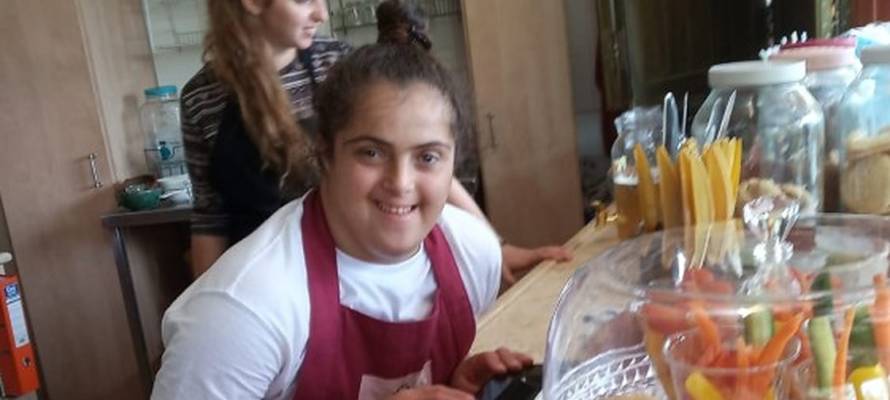Israeli law ensures that everyone has the opportunity to succeed, including those with special needs.
By Tsivya Fox-Dobuler
For a unique and enriching dining experience, try one of Israel’s “social cafes,” which are staffed by special needs individuals who take pride in their work and ability to contribute to society.
Vivienne Glaser understood early on that her mentally challenged son, Elchi, 29, would need special care for the rest of his life. She found a school with a long-term vision for her child, Sadnat Shiluv in in Gush Etzion.
Glaser told United with Israel (UWI) about some of the challenges parents face when raising a child with special needs. “Every time Elchi hit a milestone, we had to re-evaluate if his school was still meeting his needs,” she said. “Sadnat Shiluv had a long term, creative, and meaningful vision for helping people like Elchi become productive adults.”
The family held a group meeting and decided to uproot themselves from their home in the north and move to the best place for Elchi. “He joined the school’s first class 20 years ago,” she said. “He is housed in their sheltered living facility and now works at their cafe.”
Five years ago, the school established Cafe in the Grove (Cafe B’horsha) in Gvaot, a wooded area with a stunning view of the Gush Etzion Mountains.
“It’s more beautiful than Switzerland,” Glaser commented
Through classes geared to develop student capabilities, the special needs residents helped build the cafe’s furniture out of trees and lumber, planted surrounding gardens, handcrafted the dishes in the ceramic studio, wove baskets, and learned to cook, clean, take orders, handle customers, and more.
“We believe that every person, regardless of his disabilities, has the ability and potential to contribute, give, and be a significant part of a community,” Sefi Sadna, project manager for the school, told UWI. “We strive to integrate with the Gvaot community at large for the benefit of all.”
The cafe, under normal circumstances, is open every Friday. Due to coronavirus regulations, it was forced to close temporarily.
Its chefs and bakers, however, continue to use their skills at the communal kitchen in order to feed special needs residents in 10 apartments. “Keeping a routine and going out to work is crucial for our special needs residents and gives meaning to their lives,” Sadna said.
Due to the success of the cafe, plans were in place to renovate and expand in order to accommodate its many visitors and make a larger vocational kitchen. However, the coronavirus pandemic put financial strains on that dream.
“I advise parents never to decide the limits of their child,” Glaser said. “You never know what they can become. If we keep pushing them, they will achieve beyond our expectations. This cafe isn’t about being a coffee shop. It is about empowering people with disabilities to reach the next stage in life.”
‘Sweet to the Heart’
Similarly, the Lev Binyamin facility was established over two decades ago in the heart of the community of Ofra, in Israel’s Binyamin region. Its residents range from infancy to adulthood and include people with physical and intellectual developmental disabilities, people with communication disorders, and other challenges.
In 2018, the school opened a social cafe called Sweet to the Heart for the general public. It also runs the Cooking Kitchen, where those with special needs prepare food for the rehabilitation center, the childcare center, and various large group events. Its diners include groups from the municipality, visiting Israeli Members of Knesset, and army gatherings.
“This is an empowering work environment where those with special needs learn enhanced life skills under the close supervision of a professional team that trains them for the job,” Shlomit Kahan, CEO of Lev Binyamin, told UWI.
Kahan explained that everyone over 21 years of age in Israel is given the opportunity to work according to his or her cognitive level and physical capabilities. “Israeli law offers opportunities for every individual to find meaning in their lives,” she said. “All our staff gets a salary. Inspectors ensure everyone is being treated properly with a balance of work, leisure, and social times.”
In addition to acquiring cooking and baking skills, the special needs personnel are taught hygiene, how to speak when taking an order and serving, how to set a table and handle money, teamwork, and more.
They also develop warm friendships with people from the general society. “Most important, the special needs staff interacts with the community at large, which benefits everyone,” Kahan said.
“The Israeli welfare system is extremely good,” she said. “I’ve been around the world, and Israel’s attitude and understanding of those with special needs is unique. By including individuals with disabilities in public spaces, we help create a warm and embracing community that can make a significant positive impact on Israeli society.”
